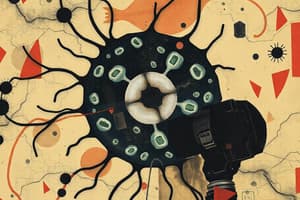Podcast
Questions and Answers
Which level of organization is directly characterized by a group of cells working together to perform a specific function?
Which level of organization is directly characterized by a group of cells working together to perform a specific function?
- System
- Organ
- Atom
- Tissue (correct)
Which principle is NOT part of Cell Theory?
Which principle is NOT part of Cell Theory?
- Cells contain mitochondria for energy production. (correct)
- Cells are the basic units of structure and function.
- All cells arise from preexisting cells.
- All living things are composed of one or more cells.
What relationship does an organ have with tissues?
What relationship does an organ have with tissues?
- An organ consists of multiple types of atoms.
- An organ is the smallest unit of life.
- An organ is made up of individual cells.
- An organ comprises groups of tissues that work together. (correct)
Which substantial discovery related to cells was made by Anton van Leeuwenhoek in 1675?
Which substantial discovery related to cells was made by Anton van Leeuwenhoek in 1675?
In which level of organization is genetic material typically found?
In which level of organization is genetic material typically found?
Flashcards
Cell Theory
Cell Theory
A set of principles stating that all living things are made of cells, cells are fundamental units of function, all cells come from existing cells, and cells contain genetic material.
Cell
Cell
Basic building block of all living organisms. Contains DNA and can replicate through mitosis.
Levels of Organization
Levels of Organization
Hierarchical structure of living organisms, from atoms to systems, showing how they're made and how they relate to one another.
Organelle
Organelle
Signup and view all the flashcards
Mitosis
Mitosis
Signup and view all the flashcards
Study Notes
Cell Theory
- Robert Hooke (1665) and Anton van Leeuwenhoek (1675) observed and drew the first cells using microscopes.
- Cell theory principles:
- All living things are made of one or more cells.
- Cells are the fundamental structural and functional units of life.
- All cells arise from pre-existing cells through cell division.
- Cells contain genetic material passed to daughter cells during division.
Levels of Biological Organization
- Organization from smallest to largest:
- Atom: The simplest unit of life (e.g., oxygen).
- Molecule: Two or more atoms combined (e.g., carbon dioxide). Essential for biochemistry.
- Organelle: Subcellular subunit with specific functions.
- Cell: Basic building block, contains hereditary information (DNA) and replicates (mitosis).
- Tissue: Specialized group of cells performing a particular function (multicellular organisms).
- Organ: Group of tissues working together for a specific function (e.g., the heart pumps blood).
- System: Group of organs and tissues working together for major functions (e.g., the digestive system).
- Organism (Individual): The complete living entity.
Studying That Suits You
Use AI to generate personalized quizzes and flashcards to suit your learning preferences.




